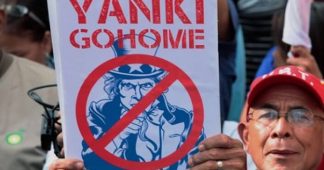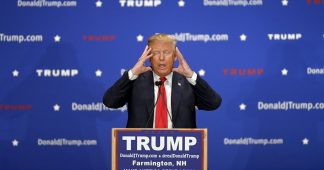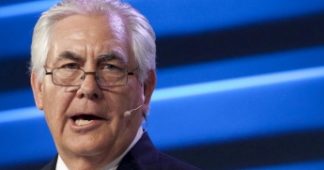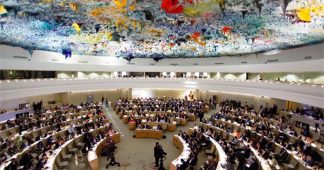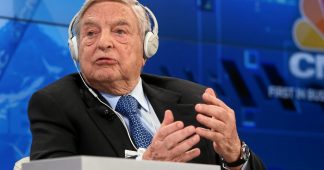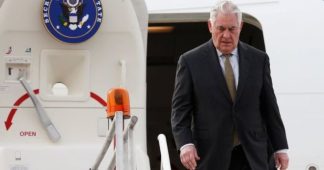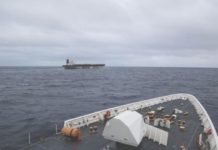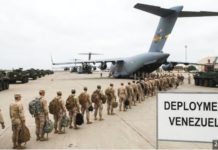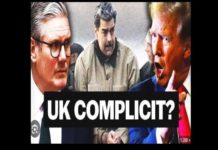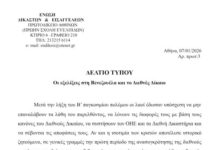Washington imposes new sanctions against Venezuela and Cuba
By Bill Van Auken
3 November 2018
US National Security Adviser John Bolton announced an escalation of US sanctions against Cuba and Venezuela during a bellicose speech delivered in Miami on Thursday to an invitation-only audience of right-wing exiles and Republican functionaries.
Bolton’s speech on the Trump administration’s policy toward Latin America amounted to a demand for regime change in Cuba and Venezuela, as well as Nicaragua, and a naked assertion of US dominance over the hemisphere, with repeated statements concerning behavior that Washington would not “tolerate” on the part of countries to the south of the US border.
Coming just five days before the US midterm elections, the speech was unquestionably part of the Trump administration’s drive to turn out its base, which in Florida includes Cuban exile organizations that have been based in Miami since the 1959 revolution that overthrew the US-backed dictatorship of Fulgencio Batista.
While Bolton’s bombastic rhetoric was no doubt intended to throw out red meat to his reactionary audience, it also provided a genuine expression of Washington’s increasingly aggressive and militaristic policy toward Latin America.
He labelled Cuba, Venezuela and Nicaragua the “Troika of Tyranny,” a deliberate imitation of George W. Bush’s “axis of evil” rhetoric that was employed during the launching of protracted and continuing US wars in the Middle East.
He continued, declaring that this “triangle of terror is the cause of immense human suffering, the impetus of enormous regional instability, and the genesis of a sordid cradle of communism in the Western hemisphere.”
He vowed that the so-called troika had “met its match” in the Trump administration, which would “no longer appease dictators and despots near our shores.” He vowed that they would “meet their demise,” that “their day of reckoning awaits” and that Washington looked “forward to watching each corner of the triangle fall.”
Bolton called upon the rest of the hemisphere to “look to the north, look to our flag” for its inspiration, presenting the United States as the champion of “human rights” and the “rule of law.”
The absurdity of this pretense was made plain by a speech delivered by Trump just hours after Bolton’s address in which the US president vowed to violate US and international law by imposing a blanket denial of asylum against Central American refugees and threatening to have US troops shoot down immigrant men, women and children on the US-Mexican border.
The most significant of the new sanctions announced in Bolton’s speech was a measure aimed at impeding Venezuela’s exports of gold, which have become an important source of foreign exchange for the country’s crisis-ridden economy. US officials claim that Venezuela has exported some 20 tons of gold to Turkey, a NATO ally with which Washington has come into increasing conflict. Caracas and the government of China also recently signed an agreement to develop what the Venezuelan government termed a strategic alliance to develop the country’s gold mining sector.
The gold sanctions announcement claims that by evading other US sanctions aimed at strangling the Venezuelan economy, the country’s trade in gold involves “deceptive practices” and “corruption.” Significantly, it adds that the measure can be extended to any other sector of the economy on the same basis, opening the door to the rapid implementation of a US embargo against Venezuelan oil, which accounts for roughly 98 percent of the country’s export earnings.
Also announced was a new set of sanctions against Cuba targeting some two dozen economic entities allegedly tied to the country’s military, which has extensive economic holdings. This is in addition to some 180 Cuban entities targeted by the Trump administration last year.
Bolton delivered his speech on the same day that the United Nations General Assembly condemned the 58-year-old US economic blockade against Cuba, with 189 countries voting for the resolution and only two – the United States and Israel – voting against.
In a question-and-answer period after the speech, Bolton indicated that the Trump administration is considering implementation of a section of the 1996 anti-Cuba Helms-Burton Law, allowing Cuban exiles in the US to file lawsuits in federal courts against companies doing business involving properties that were expropriated in the wake of the 1959 revolution. The measure has been routinely waived for over two decades because of its extra-territorial reach.
As part of its “America First” global trade war policy, it appears that the Trump White House may break with this practice, leading to a direct conflict between Washington and its leading trade partners, including Canada and the European Union, which both have extensive investments in Cuba.
While no new sanctions were announced against Nicaragua, Bolton advanced the same kind of charges and demands for regime change leveled against Cuba and Venezuela, vowing that the government of President Daniel Ortega “will feel the full weight of America’s robust sanctions regime,” with measures coming “in the very near future.” Until now, Washington has exhibited a certain ambivalence toward the government of the Sandinista leader, who returned to power in 2007 on the basis of an economic program geared to the interests of Nicaraguan and foreign capital.
Amid all of the denunciations and threats, Bolton pointed to a supposed bright spot in the Americas, the election last month in Brazil of the fascistic former army captain Jair Bolsonaro, who has celebrated the country’s former military dictatorship and its regime of torture and threatened that his political opponents would have to choose between jail and exile.
Bolton described Bolsonaro as a “likeminded leader,” whose election was one of the “positive signs for the future of the region,” demonstrating “a growing regional commitment to free market principles and open, transparent and accountable governance.”
Among Bolsonaro’s attractions for the US administration – aside for the affinity between the fascistic views of Trump and those of the Brazilian president-elect – is the latter’s vow to pursue a policy aligned with that of Washington and against the influence of China in the hemisphere. During the Brazilian election campaign, he denounced Beijing for attempting to “buy Brazil” and even made a provocative trip to Taiwan last February in an affront to the “one China” policy recognized by Brazil since the 1970s.
Behind all the posturing about “human rights” and the refusal to tolerate “despots,” US policy in Latin America is driven ever more openly by its strategic conflict with China, whose influence has steadily grown in a region long regarded by US imperialism as its “own backyard.” Once again, US officials are invoking the Monroe Doctrine and Washington’s supposed “right” to intervene to prevent “outside” powers from poaching on countries it regards as semi-colonies.
The Trump administration in September recalled its ambassadors from El Salvador, the Dominican Republic and Panama and threatened to cut off aid over the decisions by the governments of these countries to break with Taiwan – which had cemented ties with previous anti-communist dictatorships — and establish relations with Beijing.
Even so, as Bolton was making his speech in Miami, the presidents of both El Salvador and the Dominican Republic were in Beijing meeting with President Xi and other top officials. China and Panama announced on the same day that Panama City would host a China-Latin America Caribbean Business Summit next year, focused on promoting economic-commercial cooperation between the two regions. To the extent that the influence of China’s trade and investment challenges that of the US, Washington will respond with increasing provocations and militarism.
Notable in Bolton’s speech was his repeated denunciations of “communism” and “socialism,” and his insistence that the economic and social catastrophe in Venezuela—a country where finance capital has only strengthened its grip over the economy over the past 20 years and the government is run largely by the military—is an example of socialism “implemented effectively.”
Underlying this reactionary rhetoric is the fear within the US ruling class that the desperate conditions being created by the crisis of capitalism is producing a new revolutionary challenge from the Latin American working class.
